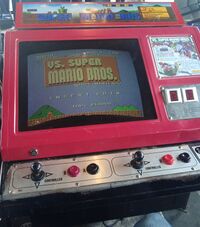VS. System: Difference between revisions
No edit summary |
mNo edit summary |
||
| Line 2: | Line 2: | ||
{{more images|Arcade cabinets needed}} | {{more images|Arcade cabinets needed}} | ||
[[File:VS Super Mario Bros Arcade Machine.jpg|thumb|''[[VS. Super Mario Bros.]]'' in a VS. Table cabinet.]] | [[File:VS Super Mario Bros Arcade Machine.jpg|thumb|''[[VS. Super Mario Bros.]]'' in a VS. Table cabinet.]] | ||
The '''VS. System''' is a collection of coin-operated VS. UniSystem or VS. DualSystem arcade systems that first appeared in 1984. As their name implies, the video games are designed for two-player competitive play. The VS. UniSystem is like a conventional upright arcade cabinet with two sets of controls and a single screen. The VS. UniSystem can either come as a dedicated gray cabinet or be a conversion from | The '''VS. System''' is a collection of coin-operated VS. UniSystem or VS. DualSystem arcade systems that first appeared in 1984. As their name implies, the video games are designed for two-player competitive play. The VS. UniSystem is like a conventional upright arcade cabinet with two sets of controls and a single screen. The VS. UniSystem can either come as a dedicated gray cabinet or be a conversion from ''[[Donkey Kong (game)|Donkey Kong]]'', ''[[Donkey Kong Jr. (game)|Donkey Kong Jr.]]'', or ''{{wp|Popeye (game)|Popeye}}'' cabinets. It is not possible to convert the dedicated wide-body ''[[Mario Bros. (game)|Mario Bros.]]'' cabinets or the ''{{wp|Punch-Out!! (arcade game)|Punch-Out!!}}'' cabinets. The VS. DualSystem comes with two screens and four sets of controls. The upright type looks like two machines conjoined at an angle while the sit-down type is red and lets players face each other. The latter was renamed VS. Table.<ref>''VS. Dr. Mario'' installation manual</ref> The games are mostly ports of [[Nintendo Entertainment System]] home console games, although many have notable changes in their graphics, gameplay, and difficulty. | ||
The VS. System was designed in response to the {{wp|video game crash of 1983}}, which saw arcade machine operators facing declining revenue while taking big risks in each new purchase. [[Nintendo]] responded by creating the Nintendo-Pak conversion kits for ''Mario Bros.'' in addition to selling the dedicated wide-body cabinets.<ref>[https://archive.org/details/mariobrospak/mode/1up ''Mario Bros.'' Nintendo-Pak'' manual]</ref> ''[[Donkey Kong 3]]'' was available only as a Nintendo-Pak, which spared operators from having to buy the cabinet.<ref>[https://archive.org/details/donkeykong3/mode/1up ''Donkey Kong 3'' Nintendo-Pak manual]</ref> The VS. System goes further by having a cabinet and PCB that allowed operators to easily swap the PPUs and ROMs for each new release with a VS.-Pak. The cost savings led to the purchase of around a hundred thousand machines and conversion kits in the US alone by 1986.<ref>[https://archive.org/details/play-meter-volume-12-number-5-april-1986-600DPI/Play%20Meter%20-%20Volume%2012%2C%20Number%205%20-%20April%201986%20%28Compressed%29/page/9/mode/1up ''Play Meter''. April 1, 1986 issue, page 9.]</ref> Its success spurred the development of the [[Nintendo PlayChoice-10]]. | The VS. System was designed in response to the {{wp|video game crash of 1983}}, which saw arcade machine operators facing declining revenue while taking big risks in each new purchase. [[Nintendo]] responded by creating the Nintendo-Pak conversion kits for ''Mario Bros.'' in addition to selling the dedicated wide-body cabinets.<ref>[https://archive.org/details/mariobrospak/mode/1up ''Mario Bros.'' Nintendo-Pak'' manual]</ref> ''[[Donkey Kong 3]]'' was available only as a Nintendo-Pak, which spared operators from having to buy the cabinet.<ref>[https://archive.org/details/donkeykong3/mode/1up ''Donkey Kong 3'' Nintendo-Pak manual]</ref> The VS. System goes further by having a cabinet and PCB that allowed operators to easily swap the PPUs and ROMs for each new release with a VS.-Pak. The cost savings led to the purchase of around a hundred thousand machines and conversion kits in the US alone by 1986.<ref>[https://archive.org/details/play-meter-volume-12-number-5-april-1986-600DPI/Play%20Meter%20-%20Volume%2012%2C%20Number%205%20-%20April%201986%20%28Compressed%29/page/9/mode/1up ''Play Meter''. April 1, 1986 issue, page 9.]</ref> Its success spurred the development of the [[Nintendo PlayChoice-10]]. | ||
Revision as of 04:48, October 16, 2022
This article is under construction. Therefore, please excuse its informal appearance while it is being worked on. We hope to have it completed as soon as possible.

The VS. System is a collection of coin-operated VS. UniSystem or VS. DualSystem arcade systems that first appeared in 1984. As their name implies, the video games are designed for two-player competitive play. The VS. UniSystem is like a conventional upright arcade cabinet with two sets of controls and a single screen. The VS. UniSystem can either come as a dedicated gray cabinet or be a conversion from Donkey Kong, Donkey Kong Jr., or Popeye cabinets. It is not possible to convert the dedicated wide-body Mario Bros. cabinets or the Punch-Out!! cabinets. The VS. DualSystem comes with two screens and four sets of controls. The upright type looks like two machines conjoined at an angle while the sit-down type is red and lets players face each other. The latter was renamed VS. Table.[1] The games are mostly ports of Nintendo Entertainment System home console games, although many have notable changes in their graphics, gameplay, and difficulty.
The VS. System was designed in response to the video game crash of 1983, which saw arcade machine operators facing declining revenue while taking big risks in each new purchase. Nintendo responded by creating the Nintendo-Pak conversion kits for Mario Bros. in addition to selling the dedicated wide-body cabinets.[2] Donkey Kong 3 was available only as a Nintendo-Pak, which spared operators from having to buy the cabinet.[3] The VS. System goes further by having a cabinet and PCB that allowed operators to easily swap the PPUs and ROMs for each new release with a VS.-Pak. The cost savings led to the purchase of around a hundred thousand machines and conversion kits in the US alone by 1986.[4] Its success spurred the development of the Nintendo PlayChoice-10.
Nintendo's final first party VS. System titles were each released in Japan in 1985[5] and in North America in 1990. The Micro VS. System line of Game & Watch games released in 1984 was named after its arcade counterpart.
List of Mario games
| Arcade game | Nintendo Entertainment System game |
|---|---|
| VS. Wrecking Crew | Wrecking Crew |
| VS. Pinball | Pinball |
| VS. Golf | Golf |
| VS. Super Mario Bros. | Super Mario Bros. |
| VS. Dr. Mario | Dr. Mario |
VS. Dr. Mario is the only arcade version that has not been made available on the Arcade Archives.
Gallery
Cabinets
Screenshots
Flyers
References
- ^ VS. Dr. Mario installation manual
- ^ Mario Bros. Nintendo-Pak manual
- ^ Donkey Kong 3 Nintendo-Pak manual
- ^ Play Meter. April 1, 1986 issue, page 9.
- ^ "Jaleco Ships New Game For "VS. System"" (Paragraph 1). Game Machine. Amusement Press. Published May 1, 1986.
 This article is a stub. You can help the Super Mario Wiki by expanding it.
This article is a stub. You can help the Super Mario Wiki by expanding it.















